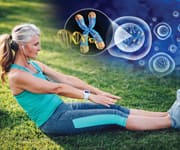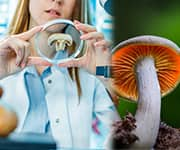Life Extension Magazine®
Human studies have found an association between mushroom consumption and lower risk of chronic diseases and premature death.
One study of more than 15,000 Americans found that those who consumed mushrooms had a 16% lower risk of mortality than those who did not eat mushrooms.
Replacing just one serving a day of red or processed meat with mushrooms was associated with a 35% lower risk of all-cause mortality.1
Research has identified an amino acid in mushrooms, L-ergothioneine, that may be responsible for these health-promoting effects.2
One of the world’s preeminent nutritional biochemists, Dr. Bruce Ames, published a seminal review proposing that L-ergothioneine should be classified as a “ longevity vitamin.”2
L-ergothioneine is not produced in the body. It must be obtained through diet.2-5
Typical American diets are low in mushrooms. L-ergothioneine levels in the body also tend to decline with age.6
For those who don’t ingest lots of mushrooms, direct oral intake of L-ergothioneine is an easy way to obtain their benefits.
What is L-Ergothioneine?
L-ergothioneine is an amino acid found in high concentrations in mushrooms and other fungi.7 High levels are found in edible mushrooms such as porcini, oyster, shiitake, and maitake.8
The amount of L-ergothioneine in mushrooms varies with the species and is impacted by conventional agricultural practices. It would take about 2-5 cups of common white button mushrooms to get 5 mg of dietary L-ergothionine.8,9 That’s why supplements are a better choice to maintain daily intake.
A growing body of evidence has found that mushrooms may help prevent chronic diseases and premature death.1
A major scientific discovery in 2005, found that humans produce a transporter protein responsible for taking up L-ergothioneine from the diet and delivering it to cells throughout the body.10
Due to the widespread tissue distribution of this transporter, it can transport L-ergothioneine 100 times more efficiently than other compounds.10-12
Clinical studies suggest most tissues of the body contain L-ergothioneine.3,4,10,13 This finding helped drive the scientific investigation into how this amino acid works in the body, and the suggestion that it be classified as a longevity vitamin.2
Reduced Telomere Shortening
Several studies have pointed out how L-ergothioneine may promote longevity.
One contributor to the aging process is the loss, or shortening, of telomeres, the protective caps on the ends of chromosomes.14 Telomere shortening is a marker of advanced cellular aging, loss of function, and eventual cell death.
A 2022 study found that L-ergothioneine significantly reduced the rate of telomere shortening and the number of short telomeres in cells exposed to oxidative stress.15
Another area being studied is L-ergothioneine’s ability to protect cellular DNA.
For example, ultraviolet-induced DNA damage in the skin accelerates skin aging and risk of skin cancer.16 L-ergothioneine protects against this DNA damage in the skin,17-20 which is one reason it is an ingredient in many anti-aging creams.21
Oxidative stress is a driver of disease and accelerated aging. L-ergothioneine is closely related to glutathione, one of the most powerful antioxidants produced in the body.8,22-24 L-ergothioneine concentrates in the mitochondria,3 which are vulnerable to oxidative damage.
Preclinical evidence shows that L-ergothioneine can help neutralize damaging oxidizing compounds before they damage mitochondria.25,26 It can also protect against free radicals that damage DNA and proteins.18,19,27
Experimental evidence has also shown that L-ergothioneine can inhibit the synthesis of pro-inflammatory cytokines, which are abundant in many chronic inflammatory diseases associated with aging.28-30
Together, these effects may help ward off chronic disease and promote longer life.
L-Ergothioneine’s Health Benefits
- In an observational study, people who consumed mushrooms had a 16% lower risk of dying than those who didn’t. The amino acid L-ergothioneine is believed to be largely responsible for mushrooms’ health benefits.
- L-ergothioneine may promote longevity by preventing shortening of telomeres, protecting DNA from damage, fighting oxidative stress and inflammation, and protecting the brain and heart.
- In a population study, higher levels of L-ergothioneine in the body were associated with reduced risk of cardiometabolic disease and cardiovascular mortality.
- In a clinical trial of adults with mild cognitive impairment, taking 5 mg of L-ergothioneine daily for 12 weeks significantly improved measures of cognitive function.
Protecting the Brain
The concentration of L-ergothioneine is particularly high in several major regions of the brain, including those responsible for cognitive function, learning, and memory.31,32
In mice, L-ergothioneine promotes nerve cell maturation, resulting in enhanced memory.33 Cell studies show it helps promote the formation of new neurons,32,34,35 which is vital to learning and also to memory formation.36
In animal models, it is protective against oxidative-stress-induced deficits in learning and memory37 and learning deficits induced by beta-amyloid accumulation.38 Beta-amyloid buildup is seen in the brains of patients with Alzheimer’s disease, making L-ergothioneine an intriguing candidate for clinical studies looking at neuroprotective agents.
In humans, lower blood levels of L-ergothioneine have been noted in patients with both mild cognitive impairment and dementia, compared to healthy subjects, suggesting that low L-ergothioneine could be a risk factor for these conditions.39-41 Low levels of L-ergothioneine are also seen in patients with Parkinson’s disease42 and brain matter atrophy.43
In a clinical trial of adults with mild cognitive impairment, taking a mushroom extract containing 5 mg of L-ergothioneine daily for 12 weeks led to significant improvements in verbal memory, working memory, sustained attention, and other measures of cognitive function compared to those taking a placebo.44
Cardiovascular Health
Diseases of the heart and blood vessels remain the leading causes of death and disability.45
Dysfunction of the vascular endothelium is central to a wide range of cardiovascular disorders, including hypertension, atherosclerosis, chronic heart failure, coronary artery disease, and diabetes.46
L-ergothioneine has been found to be protective against different types of oxidative and inflammatory damage in endothelial cells,47,48 which form the inner lining of blood vessels.
It also protects against cell stressors that impair vascular relaxation,49 and prevents the binding of monocytes (a type of white blood cell) to endothelial cells, an early event in cardiovascular disease.4,50
A large population study published in 2020 showed that higher levels of L-ergothioneine in the body are associated with reduction of cardiometabolic diseases by 15%, cardiovascular mortality by 21%, and overall mortality by 14%.51
Other studies revealed that L-ergothionine protects the endothelium from cell death.48
Summary
L-ergothioneine is an amino acid found predominantly in mushrooms.
Its potent antioxidant and anti-inflammatory effects may help slow the cellular aging process and protect the body against age-related disorders, including neurodegenerative and cardiovascular diseases.
This may explain why, in population studies, people who eat mushrooms have a reduced risk of mortality.
If you have any questions on the scientific content of this article, please call a Life Extension Wellness Specialist at 1-866-864-3027.
References
- Ba DM, Gao X, Muscat J, et al. Association of mushroom consumption with all-cause and cause-specific mortality among American adults: prospective cohort study findings from NHANES III. Nutr J. 2021 Apr 22;20(1):38.
- Ames BN. Prolonging healthy aging: Longevity vitamins and proteins. Proc Natl Acad Sci U S A. 2018 Oct 23;115(43):10836-44.
- Cheah IK, Halliwell B. Ergothioneine, recent developments. Redox Biol. 2021 Jun;42:101868.
- Paul BD. Ergothioneine: A Stress Vitamin with Antiaging, Vascular, and Neuroprotective Roles? Antioxid Redox Signal. 2022 Jun;36(16-18):1306-17.
- Cheung B, Kwan M, Chan R, et al. Potential of Asian Natural Products for Health in Aging. In: Malavolta M, Mocchegiani E, editors. Molecular Basis of Nutrition and Aging. San Diego: Academic Press; 2016:659-76.
- Beelman RB, Kalaras MD, Phillips AT, et al. Is ergothioneine a ‘longevity vitamin’ limited in the American diet? J Nutr Sci. 2020;9:e52.
- Jones GW, Doyle S, Fitzpatrick DA. The evolutionary history of the genes involved in the biosynthesis of the antioxidant ergothioneine. Gene. 2014 Oct 1;549(1):161-70.
- Kalaras MD, Richie JP, Calcagnotto A, et al. Mushrooms: A rich source of the antioxidants ergothioneine and glutathione. Food Chem. 2017 Oct 15;233:429-33.
- Halliwell B, Cheah IK, Tang RMY. Ergothioneine - a diet-derived antioxidant with therapeutic potential. FEBS Lett. 2018 Oct;592(20):3357-66.
- Gründemann D, Harlfinger S, Golz S, et al. Discovery of the ergothioneine transporter. Proc Natl Acad Sci U S A. 2005 Apr 5;102(14):5256-61.
- Grigat S, Harlfinger S, Pal S, et al. Probing the substrate specificity of the ergothioneine transporter with methimazole, hercynine, and organic cations. Biochem Pharmacol. 2007 Jul 15;74(2):309-16.
- Tucker RAJ, Cheah IK, Halliwell B. Specificity of the ergothioneine transporter natively expressed in HeLa cells. Biochem Biophys Res Commun. 2019 May 21;513(1):22-7.
- Cheah IK, Tang RM, Yew TS, et al. Administration of Pure Ergothioneine to Healthy Human Subjects: Uptake, Metabolism, and Effects on Biomarkers of Oxidative Damage and Inflammation. Antioxid Redox Signal. 2017 Feb 10;26(5):193-206.
- Donate LE, Blasco MA. Telomeres in cancer and ageing. Philos Trans R Soc Lond B Biol Sci. 2011 Jan 12;366(1561):76-84.
- Samuel P, Tsapekos M, de Pedro N, et al. Ergothioneine Mitigates Telomere Shortening under Oxidative Stress Conditions. J Diet Suppl. 2022;19(2):212-25.
- D’Orazio J, Jarrett S, Amaro-Ortiz A, et al. UV radiation and the skin. Int J Mol Sci. 2013 Jun 7;14(6):12222-48.
- Bazela K, Solyga-Zurek A, Debowska R, et al. l-Ergothioneine Protects Skin Cells against UV-Induced Damage—A Preliminary Study. Cosmetics. 2014;1(1):51-60.
- Hseu YC, Lo HW, Korivi M, et al. Dermato-protective properties of ergothioneine through induction of Nrf2/ARE-mediated antioxidant genes in UVA-irradiated Human keratinocytes. Free Radic Biol Med. 2015 Sep;86:102-17.
- Obayashi K, Kurihara K, Okano Y, et al. L-Ergothioneine scavenges superoxide and singlet oxygen and suppresses TNF-alpha and MMP-1 expression in UV-irradiated human dermal fibroblasts. J Cosmet Sci. 2005 Jan-Feb;56(1):17-27.
- Rai RK, Chalana A, Karri R, et al. Role of Hydrogen Bonding by Thiones in Protecting Biomolecules from Copper(I)-Mediated Oxidative Damage. Inorg Chem. 2019 May 20;58(10):6628-38.
- Cronin H, Draelos ZD. Top 10 botanical ingredients in 2010 anti-aging creams. J Cosmet Dermatol. 2010 Sep;9(3):218-25.
- Wu G, Fang YZ, Yang S, et al. Glutathione metabolism and its implications for health. J Nutr. 2004 Mar;134(3):489-92.
- Dong KK, Damaghi N, Kibitel J, et al. A comparison of the relative antioxidant potency of L-ergothioneine and idebenone. J Cosmet Dermatol. 2007 Sep;6(3):183-8.
- Franzoni F, Colognato R, Galetta F, et al. An in vitro study on the free radical scavenging capacity of ergothioneine: comparison with reduced glutathione, uric acid and trolox. Biomed Pharmacother. 2006 Sep;60(8):453-7.
- Kerley RN, McCarthy C, Kell DB, et al. The potential therapeutic effects of ergothioneine in pre-eclampsia. Free Radic Biol Med. 2018 Mar;117:145-57.
- Paul BD, Snyder SH. The unusual amino acid L-ergothioneine is a physiologic cytoprotectant. Cell Death Differ. 2010 Jul;17(7):1134-40.
- Markova NG, Karaman-Jurukovska N, Dong KK, et al. Skin cells and tissue are capable of using L-ergothioneine as an integral component of their antioxidant defense system. Free Radic Biol Med. 2009 Apr 15;46(8):1168-76.
- Borodina I, Kenny LC, McCarthy CM, et al. The biology of ergothioneine, an antioxidant nutraceutical. Nutr Res Rev. 2020 Dec;33(2):190-217.
- Laurenza I, Colognato R, Migliore L, et al. Modulation of palmitic acid-induced cell death by ergothioneine: evidence of an anti-inflammatory action. Biofactors. 2008;33(4):237-47.
- Rahman I, Gilmour PS, Jimenez LA, et al. Ergothioneine inhibits oxidative stress- and TNF-alpha-induced NF-kappa B activation and interleukin-8 release in alveolar epithelial cells. Biochem Biophys Res Commun. 2003 Mar 21;302(4):860-4.
- Ishimoto T, Kato Y. Ergothioneine in the brain. FEBS Lett. 2022 May;596(10):1290-8.
- Nakamichi N, Taguchi T, Hosotani H, et al. Functional expression of carnitine/organic cation transporter OCTN1 in mouse brain neurons: possible involvement in neuronal differentiation. Neurochem Int. 2012 Dec;61(7):1121-32.
- Nakamichi N, Nakao S, Nishiyama M, et al. Oral Administration of the Food-Derived Hydrophilic Antioxidant Ergothioneine Enhances Object Recognition Memory in Mice. Curr Mol Pharmacol. 2021;14(2):220-33.
- Ishimoto T, Masuo Y, Kato Y, et al. Ergothioneine-induced neuronal differentiation is mediated through activation of S6K1 and neurotrophin 4/5-TrkB signaling in murine neural stem cells. Cell Signal. 2019 Jan;53:269-80.
- Ishimoto T, Nakamichi N, Hosotani H, et al. Organic cation transporter-mediated ergothioneine uptake in mouse neural progenitor cells suppresses proliferation and promotes differentiation into neurons. PLoS One. 2014;9(2):e89434.
- Toda T, Parylak SL, Linker SB, et al. The role of adult hippocampal neurogenesis in brain health and disease. Mol Psychiatry. 2019 Jan;24(1):67-87.
- Song TY, Lin HC, Chen CL, et al. Ergothioneine and melatonin attenuate oxidative stress and protect against learning and memory deficits in C57BL/6J mice treated with D-galactose. Free Radic Res. 2014 Sep;48(9):1049-60.
- Yang NC, Lin HC, Wu JH, et al. Ergothioneine protects against neuronal injury induced by beta-amyloid in mice. Food Chem Toxicol. 2012 Nov;50(11):3902-11.
- Cheah IK, Feng L, Tang RMY, et al. Ergothioneine levels in an elderly population decrease with age and incidence of cognitive decline; a risk factor for neurodegeneration? Biochem Biophys Res Commun. 2016 Sep 9;478(1):162-7.
- Kameda M, Teruya T, Yanagida M, et al. Frailty markers comprise blood metabolites involved in antioxidation, cognition, and mobility. Proc Natl Acad Sci U S A. 2020 Apr 28;117(17):9483-9.
- Teruya T, Chen YJ, Kondoh H, et al. Whole-blood metabolomics of dementia patients reveal classes of disease-linked metabolites. Proc Natl Acad Sci U S A. 2021 Sep 14;118(37).
- Hatano T, Saiki S, Okuzumi A, et al. Identification of novel biomarkers for Parkinson’s disease by metabolomic technologies. J Neurol Neurosurg Psychiatry. 2016 Mar;87(3):295-301.
- Wu LY, Cheah IK, Chong JR, et al. Low plasma ergothioneine levels are associated with neurodegeneration and cerebrovascular disease in dementia. Free Radic Biol Med. 2021 Dec;177:201-11.
- Watanabe N MS, Suzuki M, Fukaya T, Kato Y, Hashiya N. Effect of ergothioneine on the cognitive function improvement in healthy volunteers and mild cognitive impairment subjects–A randomized, double-blind, parallel-group comparison study. Jpn Pharmacol Ther. 2020;48:685–97.
- Available at: https://www.cdc.gov/heartdisease/facts.htm. Accessed October 17, 2022.
- Zhazykbayeva S, Pabel S, Mügge A, et al. The molecular mechanisms associated with the physiological responses to inflammation and oxidative stress in cardiovascular diseases. Biophys Rev. 2020 Aug;12(4):947-68.
- Li RW, Yang C, Sit AS, et al. Uptake and protective effects of ergothioneine in human endothelial cells. J Pharmacol Exp Ther. 2014 Sep;350(3):691-700.
- Servillo L, D’Onofrio N, Casale R, et al. Ergothioneine products derived by superoxide oxidation in endothelial cells exposed to high-glucose. Free Radic Biol Med. 2017 Jul;108:8-18.
- Gokce G, Arun MZ. Ergothioneine produces relaxation in isolated rat aorta by inactivating superoxide anion. Eur Rev Med Pharmacol Sci. 2014;18(21):3339-45.
- Martin KR. The bioactive agent ergothioneine, a key component of dietary mushrooms, inhibits monocyte binding to endothelial cells characteristic of early cardiovascular disease. J Med Food. 2010 Dec;13(6):1340-6.
- Smith E, Ottosson F, Hellstrand S, et al. Ergothioneine is associated with reduced mortality and decreased risk of cardiovascular disease. Heart. 2020 May;106(9):691-7.




